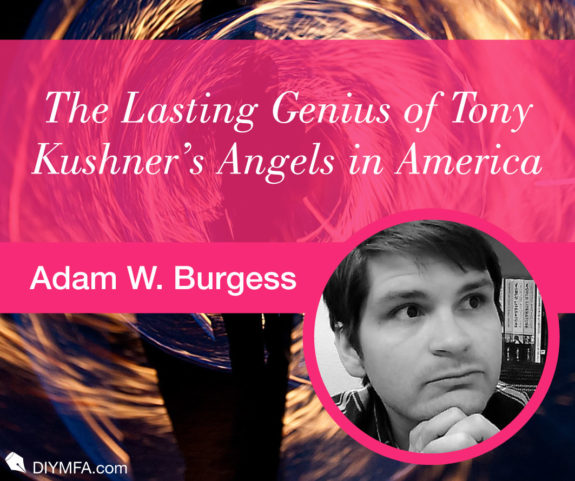Not long ago, I finished my fourth read of Tony Kushner’s Angels in America. It is one of those rare texts that doesn’t just invite itself for a revisit, but is almost a necessary lifelong companion. Speaking as it does on homosexuality in America, and on the AIDS crisis (and the political mess that surrounded/continues to surround it), the play deserves continued attention and examination, particularly now, that we’ve begun to emerge from another pandemic.
But that’s all the sociopolitical side of things. The play is also simply good, wildly brazen, and a lot of fun, despite it also being incredibly painful and sensitive.
Two Plays Together
Tony Kushner’s masterpiece is two plays packaged together. The first play is called Millennium Approaches, and the second is titled Perestroika. The reason for each title is made clear, not just in the theme of each part, but in the very literal text. Part one deals with the awareness of “the plague” as told from one character’s perspective, as well as the other awakenings that are happening to the disillusioned post-Reagan. The second part deals with the managing, if not acceptance, of the many real problems that Americans in the early-1990s were facing. In this way, the two plays tell the two most important parts of a crisis — the recognition of it and the fallout from it.
A Masterpiece of Metaphor
One thing that stands out to me most upon this recent reading is just how fabulously genius the metaphors are; they seem very much “in your face” because they very much are in your face (one Act in the play is titled “Spooj.” I mean, hello!) And yet, behind the trumpeting and the camping and the filthy language and the wild, uncensored eroticism (orgasm in the arms of an angel? Oh boy!), there’s a subtle sensitivity, a deep root being strummed in a way that is both painful and almost cathartic.
A Classic of Characterization
Characterization and character struggle is also a strength. Whether the issue is romantic infidelity, drug addiction, religion (the falling from it or the falling toward it), politics, or disease, each character’s experience is developed in a way that is unusual for drama; they are given depth and personality, and the time it takes to deal with their problems. Drama is primarily about action, but Kushner, though using action to propel the plot, also relies on more traditionally narrative-like characterization to illustrate the play’s major themes and to help the audience feel more invested.
Complexity and Diversity
Something else I enjoy very much about the play, especially considering its time of publication, is how it outlines the complexity and diversity of gay experiences. In literature and the arts, where one might assume homosexuality is more known and accepted, it is homosexual stereotypes, not lives, that have been most often articulated and perpetuated. (A chapter in my book, From A Whisper to A Riot, deals with this, if you’re interested in learning more about this history.) Kushner, though, allows one of his characters to essentially call out that kind of stereotyping (literally, using the word) and then develops several diverse gay men who have extraordinarily little in common, opening the very idea of what it means, or could mean, to be a gay man in America.
The only prominent piece of literature to that point that had done something similar is Mart Crowley’s The Boys in the Band, but unfortunately, that play is far less complex and falls into the trap of its time, being filled with characters who mostly hate themselves and each other—not exactly inspiring, though understandable for a play written in 1968. In fact, I think an interesting exercise would be to perform a close comparative analysis of The Boys in the Band and Angels in America, to see just how much changed for gay men between 1970 and 1990.
In Conclusion
My thoughts on this one could run in so many directions, but to put it simply, I think Angels in America should be required reading. It is not just a staple of American drama and an important artifact in the history of that genre, but it is also an important historical artifact more generally. Kushner litters the play with references and allusions to classical mythology, Christianity, Mormonism, Judaism, atheism, American government, science, addiction, war, politics, and so many other factors, that one is sure to walk away from it not only having been entertained and challenged, because it is challenging in its themes, tone, and delivery, but also edified and, perhaps, with a great deal of new questions to consider.
And a final note: the play was beautifully adapted by HBO into a 6-part miniseries starring Meryl Streep, Al Pacino, Emma Thompson, Mary-Louise Parker, James Cromwell, Michael Gambon, and others of that caliber. It is well worth the watch.

Adam W. Burgess is an English Professor at College of Southern Nevada. He has a Ph.D. from Northern Illinois University and is pursuing a post-doc writing certificate at the University of California, Berkeley. He loves engaging in all topics related to LGBTQ literature and craft. You can find Adam on his website or follow him on Twitter and Instagram.







